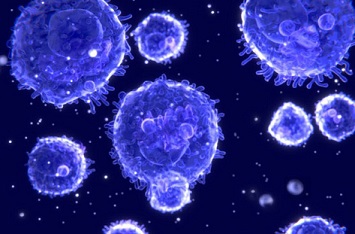COVID-19 News: Stanford Study Find That SARS-CoV-2 Infection Weakens CD8 T Cell Response to COVID-19 Vaccines
COVID-19- News - CD8 T Cells Mar 23, 2023 2 years, 4 days, 19 hours, 8 minutes ago
COVID-19 News: A new study led by researchers from Stanford University has found that prior SARS-CoV-2 infections can diminish CD8+ T cell activation and expansion in individuals receiving the COVID-19 vaccinations.

The study team conducted the study using spheromers to identify dominant T cell epitopes in response to the Pfizer/BioNTech BNT162b2 mRNA COVID-19 vaccine.
T cells play a crucial role in fighting SARS-CoV-2 infections and controlling the virus. The study examined two groups of COVID-19 patients to compare differences between the immune responses triggered by the vaccine and natural SARS-CoV-2 infections.
The study team also assessed the SARS-CoV-2 spike protein-specific CD8+ T cell responses in vaccinated individuals with and without prior infections.
Study findings showed that the BNT162b2 vaccine produced strong T-cell responses against the SARS-CoV-2 spike protein. However, the study found that prior COVID-19 patients had significantly lower T cell responses compared to vaccinated individuals without prior infections.
Additionally, the virus-specific T cells showed qualitative differences, with the vaccine promoting rapid effector T cell induction that declined by the third month, while memory T cell frequency increased. In COVID-19 patients, very low levels of CD8+ memory T cells were detected even five months after symptom onset.
Notably, the study found that previous SARS-CoV-2 infections led to a significant reduction in CD8+ T cell frequencies and impaired their functionality compared to those without prior infections. CD4+ T cell responses to vaccination, however, remained unaffected by previous infections.
In conclusion, the study suggests that individuals with prior SARS-CoV-2 infections may have reduced CD8+ T cell responses to mRNA COVID-19 vaccines, making them potentially more susceptible to future infections despite being vaccinated. On the other hand, CD4+ T cell responses are not negatively impacted by previous infections.
This finding highlights the importance of understanding the long-term effects of SARS-CoV-2 infections on the immune system and tailoring vaccination strategies accordingly… which is an important need as stressed by previous
COVID-19 News coverages.
The study findings were published in the peer reviewed journal: Immunity
https://www.sciencedirect.com/science/article/pii/S1074761323001255
The study team are the first to investigate mechanisms behind the high efficacy of RNA vaccines such as BNT162b2 (Pfizer-BioNTech) against SARS-CoV-2 and their implications for vaccine design against other pathogens using spheromer technology.
This new technology was used to analyze the kinetics and durability of epitope-specific CD8+ and CD4+ T cell responses after mRNA vaccination in both COVID-19-naïve and previously infected individuals.
The study findings showed that the BNT162b2 vaccine rapidly induced CD8+ and CD4+ T cell responses. Interestingly, the CD4+ T cell response kineti
cs were synchronous with the spike-specific antibody response, peaking at day 28 after the second dose, while the CD8+ T cell response increased up to day 42, three weeks after the second dose. This discordance may be due to the distinct features of the mRNA vaccine platform.
The study team observed a durable T cell response, with spike-specific CD8+ and CD4+ T cells still detectable 3-4 months after vaccination. This stable memory pool could potentially protect against future SARS-CoV-2 infections.
In comparison to vaccination, the study found that the circulating antigen-specific CD8+ T cell response was much lower in SARS-CoV-2 infection. The magnitude of the CD8+ T cell response after vaccination was significantly higher than in infected individuals.
The study also observed a skewing in the preferred CD8+ T cell epitopes targeted after infection in comparison to vaccination.
Furthermore, the study found that previously infected individuals had a major reduction in both the magnitude and functionality of peak CD8+ T cell responses after vaccination. This could be a result of the disproportionate effect of infection on the CD8+ T cell compartment in comparison to CD4+ T cells. The attenuated CD8+ T cell responses in previously infected individuals might contribute to long COVID, potentially rendering patients unable to respond robustly to subsequent infections by SARS-CoV-2 variants or other pathogens.
Another factor that could contribute to the lower circulating spike-specific T cells in convalescent individuals could be the reduced immunogenicity of the mRNA vaccine resulting from antigen sequestration mediated by infection-induced antibodies in circulation.
The study team also evaluated the conservation of spike-derived T cell epitopes across SARS-CoV-2 variants. They found that the dominant epitopes identified in this study are almost completely conserved, including in the BA.4 and BA.5 subvariants. This is critical because reductions in the neutralizing antibody titer in comparison to the reference Wu-1 isolate have been seen with the Omicron subvariants, even after the administration of a booster dose (3rd vaccine dose).
Considering the continued viral evolution, the identification of conserved, dominant T cell epitopes as reported in this study may facilitate the much-needed development of pan-coronavirus vaccines.
In conclusion, the study sheds light on the magnitude, diversity, and kinetics of specific CD4+ and CD8+ T cell responses after BNT162b2 vaccination, as well as the effects of SARS-CoV-2 infection on these responses. It will be interesting to see whether some of the characteristics observed here are common features of RNA vaccines for other pathogens. Additionally, the apparent damage of the CD8+ T cell response by viral infection is a cause for concern and may leave even vaccinated individuals with prior infection at risk for subsequent infections
For the latest
COVID-19 News, keep on logging to Thailand Medical News.
